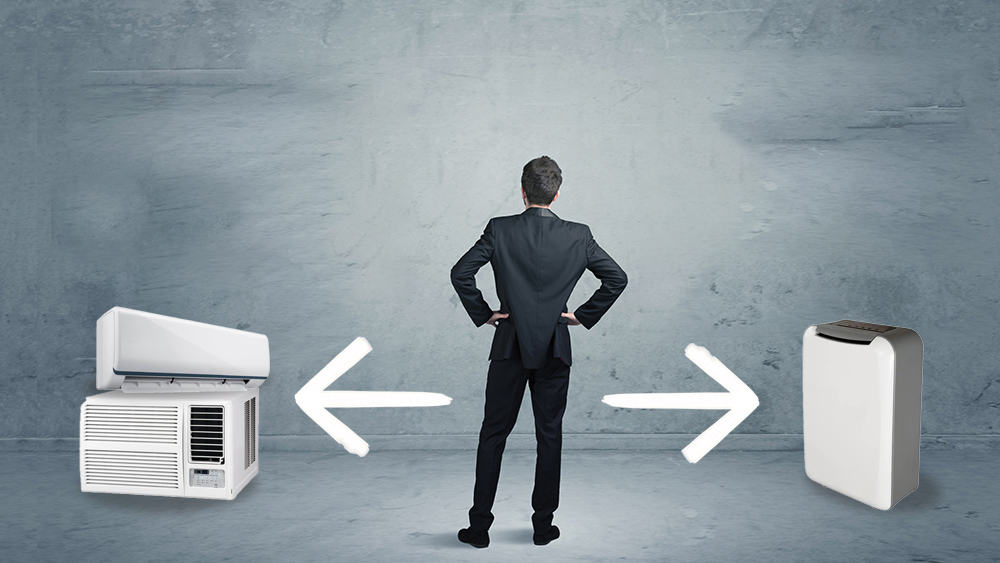As summer’s heat and humidity sweep in, finding ways to maintain a comfortable indoor environment becomes a priority. One common query that surfaces is whether an air conditioner can be employed as a dehumidifier. In this informative guide, we will explore the relationship between air conditioning and dehumidification, shedding light on how your cooling system can assist in managing indoor humidity levels.
The Dual Role of Air Conditioning: Cooling and Dehumidification
While the primary function of an air conditioner is to cool the air, it also serves as a secondary dehumidifier. The cooling process inherently tackles moisture reduction, leading to lower humidity levels indoors. Here’s how this two-fold action unfolds:
Cooling Coils: Air conditioners are equipped with cooling coils that extract heat from the indoor air, effectively lowering its temperature before recirculating it into the room.
Condensation Effect: As warm, humid air flows over the cooling coils, the moisture in the air condenses, forming tiny water droplets on the coils’ surface.
Dehumidification Process: These water droplets are then collected and drained away, successfully removing humidity from the air and consequently decreasing indoor moisture levels.
Leveraging Your Air Conditioner for Dehumidification
While air conditioners do contribute to dehumidification, their effectiveness might be somewhat limited, particularly in extremely humid conditions. Here’s what to consider:
- Partial Dehumidification: Air conditioners prioritize cooling, and while they can indeed control humidity to a certain degree, standalone dehumidifiers are typically more efficient at extracting excess moisture.
- Cooling Overdrive: Relying solely on your air conditioner for dehumidification could lead to excessive cooling of your space, resulting in both discomfort and elevated energy expenses.
- Dedicated Dehumidifiers: If tackling humidity is a top priority, investing in a standalone dehumidifier proves more adept at efficiently removing moisture from the air.
Practical Tips for Effective Dehumidification via Your Air Conditioner
If you’re planning to utilize your air conditioner for dehumidification, consider these practical steps:
Temperature Adjustment: Opt for a slightly higher temperature setting to balance cooling and dehumidification. This prevents unnecessary cooling and potential energy wastage.
Maintenance Matters: Regularly clean your air conditioner’s filters and coils to ensure optimal performance for both cooling and dehumidification.
Ventilation Strategy: Implement proper ventilation practices to maintain good indoor air quality and disperse excess moisture. Opening windows when outdoor humidity is lower can aid this process.
In Conclusion: Striking a Balance Between Cooling and Dehumidification
Although air conditioners do play a role in dehumidification, their primary purpose remains cooling. Relying solely on an air conditioner for dehumidification might not yield the most efficient outcomes. For significant humidity control, investing in a dedicated dehumidifier is a more effective solution. Nonetheless, by optimizing your air conditioner’s settings, performing regular maintenance, and ensuring proper ventilation, you can achieve a balance between cooling and dehumidification, ensuring indoor comfort even during the most humid months.
FAQs
1. Can an air conditioner effectively dehumidify indoor air?
While air conditioners do contribute to dehumidification, their primary function is cooling. They are not as efficient as standalone dehumidifiers in removing excess moisture.
2. Is it recommended to solely use an air conditioner for dehumidification?
While possible, it could result in overcooling and higher energy consumption. Standalone dehumidifiers are specifically designed for efficient moisture extraction.
3. Are there specific settings for effective dehumidification using an air conditioner?
Slightly raising the temperature setting and maintaining proper ventilation can help strike a balance between cooling and dehumidification.
4. Is investing in a dedicated dehumidifier a better choice?
If humidity control is a primary concern, a standalone dehumidifier offers superior efficiency and accuracy in removing moisture, as compared to relying solely on an air conditioner for dehumidification.
Zeeshan is a seasoned tech expert and senior writer at Teckrr.com. With over 10 years of experience in tech journalism, he brings insightful analysis and up-to-date information on the latest tech trends. Zeeshan holds a MBA degree from Business and Tech University and is known for his engaging writing style and ability to demystify complex tech topics. Stay connected with the cutting-edge of technology through his expert lens.

Leave a Reply